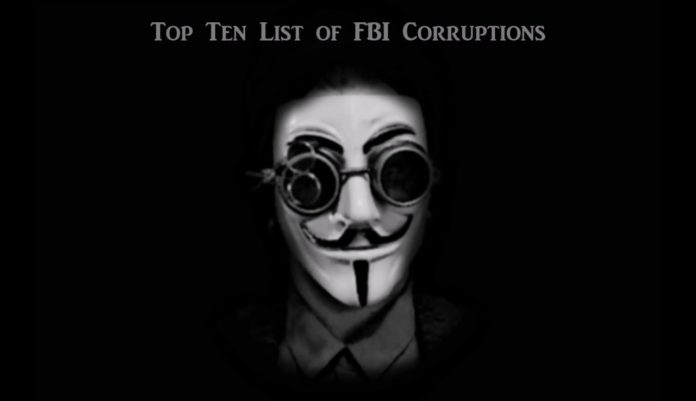
Supported large in part by its glamorized reputation in film and the media, the Federal Bureau of Investigation tries to retain the image of a patriotic legion bringing justice to the streets of America. Quite often, however, we have found this to be opposite of the truth. Here’s our top ten list of FBI corruptions that will make you question this department’s value, relevancy, and motives.
#10: Infiltration
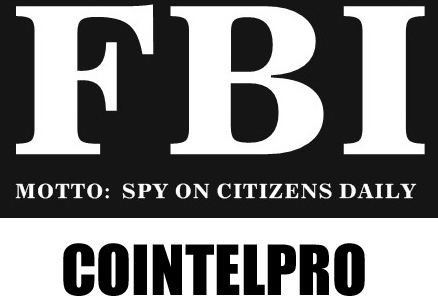
Known as COINTELPRO, short for The Counterintelligence Program, FBI agents posed as members of various movements in an attempt to gather information and cause discord within ranks. Originally intended to target communists, the program eventually branched out to include the Black Panthers, socialists, Puerto Rican groups, anti-war movements, activist groups, and any other group or organization that opposed government ideals. Even by the Federal Bureau’s own admission, the program was rightly criticized by both Congress, and the American people. However, while the program was supposedly discontinued in 1971, there are many who believe the FBI still employs the same tactics today.
#9: Flawed Court Testimonies
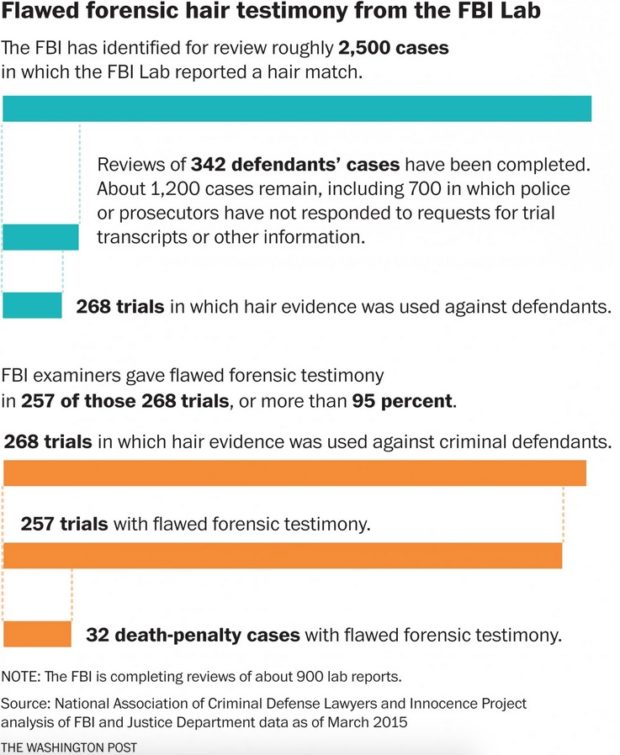
According to the National Association of Criminal Defense Lawyers and the Innocence Project, both the Justice Department and the FBI have acknowledged that in over 95-percent of trials that were reviewed, forensic matches were overstated in ways that favored prosecutors, and insured convictions. Included on the list of those who may have been wrongly convicted were at least thirty-five death row inmates. Of those inmates, errors were found in thirty-two of the cases, however nine of the inmates had already been executed. Another five died of other causes while on death row.
The investigation into these flawed forensic testimonies began in 2012, and are ongoing. So far after three years, only 268 cases have been reviewed out of a list of 2,500. Senator Richard Blumenthal of Connecticut has called the findings both “appalling and chilling,” and has called on the FBI and justice department to notify the defendants included in the reviews, and to redouble their efforts in reviewing the remaining cases.
#8: Contradictory Tactics

The FBI has been using tactics many are referring to as “grotesque,” contradicting the organization’s claimed initiatives. Such is the case of former FBI informant, Craig Monteilh, who claims he was instructed to have sex with Muslim women at an Orange County, California mosque in order to “find terrorists” and obtain information. Monteilh was eventually expelled from the Muslim community for expressing violence, which included inquiries into obtaining weapons, and indicating his desire to be a martyr. After obtaining a restraining order against Monteilh, Muslim mosque members then informed the FBI of his actions, having no idea he was an informant.
#7: Selective Justice

The FBI has been known to use selective justice in cases that either effect the bureau, or may incriminate them in illegal activity. This was the case with former FBI supervisor, John Morris, whose sorted past caught up to him in 2013 after it was revealed that he and other FBI agents had close friendships with gangsters in the Boston area throughout the 1970s and 80s. Many of these gangsters had payed Morris and his colleagues off to avoid convictions, as well as providing the agency with information on other gangs.
Yet another example of the FBI’s selective justice policy is a case from 1965 in which the agency purposefully withheld evidence that would have prevented four men from spending over three decades in prison for a mob murder they did not commit. According to federal judge, Nancy Gertner, the FBI knew the four men had been falsely accused, however in their attempts to protect a former gangster-turned-informant, the wrongly convicted men were considered “collateral damage” in the war against the mafia. While two of the men died behind bars, the other two, including joseph Salvati, were exonerated in 2001 after which the government was forced to pay a record 102 million dollars to the surviving men as compensation.
#6: Whistleblower Dissent

The United States government has made it clear that it does not tolerate whistleblowers, and the FBI is especially intolerant of such dissent. In theory, employees are encouraged to step forward when any form of waste or misconduct is observed, however the reality of the situation is that those who step forward become targets. The FBI is known to turn on whistleblowers the way gangsters turn on snitches. Compared with other government agencies, FBI whistleblowers have the least protection against retaliation from management. Many don’t step forward until they have left the agency, while others are forced to seek help from congress to see that justice is done, and then of course, there are those who will never step forward at all.
#5: Spying on Citizens
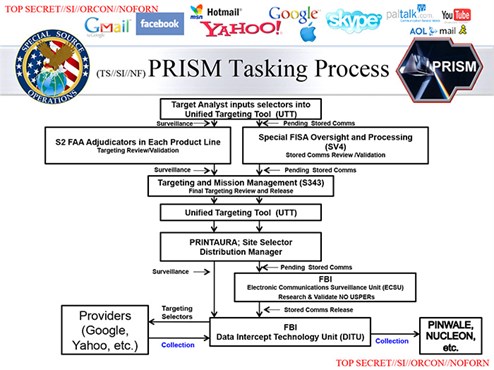
Although the NSA was widely blamed for the mass surveillance of citizens not only in the United States, but around the world, it is in fact the FBI who created the “data intercept technology unit” that collects people’s personal data for the NSA’s prism program. FBI director, James Comey, has also suggested that companies should develop interception solutions in retaliation of Apple and Android’s announcement that they would be encrypting user data. He concludes that if companies won’t take it upon themselves to tailor products to government surveillance desires, then Congress may have to force them to.
#4: Spying on Celebrities
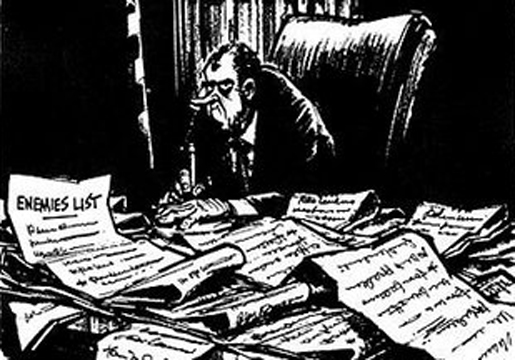
Celebrities are not protected from the government by their status, as is clear from Richard Nixon’s famous “enemies list” which included among politicians, journalists and activists, celebrities whom Nixon, in his paranoid delirium, believed were out to sabotage his presidency and reputation. The FBI has also conducted surveillance on numerous celebrities over the years, including Marilyn Monroe due to her ties with the Kennedys, John Lennon for his anti-war activism, and even Charlie Chaplin, who the FBI wanted to ban from the US completely for his anarchist views. While many may assume celebrities are protected by their wealth, status, and connections, the truth is they are pushed into the spotlight when they express any views or ideals that contradict the governments, making them easy targets.
#3: Encouraging Suicide
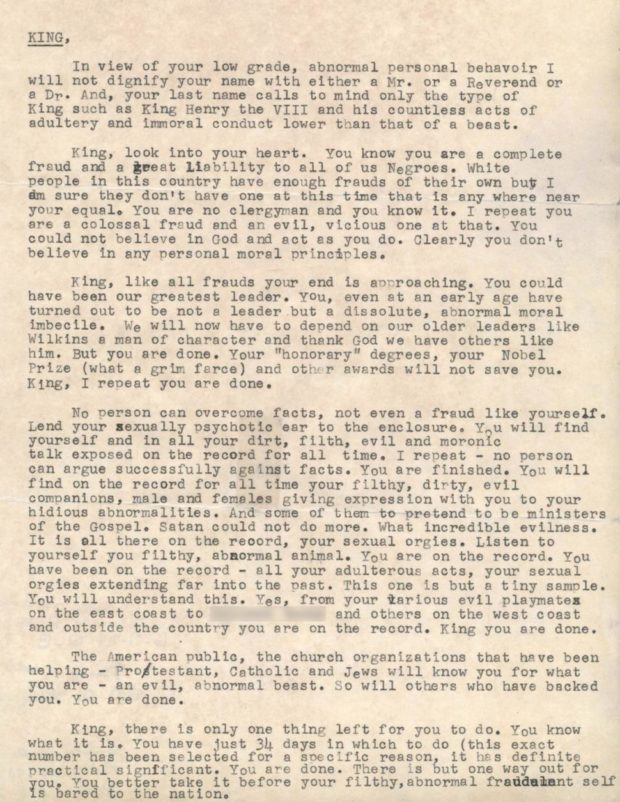
Nearly fifty years ago, Martin Luther King Junior received a horrendous letter from a supposed ex-supporter who had become disillusioned with him. The letter attempted to exploit King’s sexual behavior, as well as urging him to commit suicide. King had suspected at the time that the letter was not from a disenchanted supporter, but from the FBI, and more than a decade later the Senate’s Church Committee on Intelligence Overreach, which was chaired by Senator Frank Church of Idaho, confirmed that suspicion. J. Edgar Hoover was the director of the FBI at this time, and a copy of the letter is stored in his official and confidential files at the National Archives. The “suicide letter” has since gone down as one of the most embarrassing examples of the lack of control Hoover held over agents in the FBI during his years as director.
#2: Japanese-American Internment Camps

Inspired by exaggerated fears of a Japanese invasion during WWII, as well as pressure from whites who saw an opportunity to gain possession of Japanese-American property, the military successfully persuaded president Franklin D. Roosevelt to issue executive order 9066. The order allowed the relocation of more than one-hundred thousand men, women and children of Japanese descent from the West Coast of the United States to internment camps placed in various locations inland. The details of this reprehensible act are often overlooked due to its shocking nature, however it was the FBI who produced the list of those rounded up based on supposed allegations of contraband, and associations with Japanese nationalistic groups. The FBI rarely receives its share of criticism for this racist, unconstitutional and inhumane stain on American history.
#1: Planning Terrorist Plots
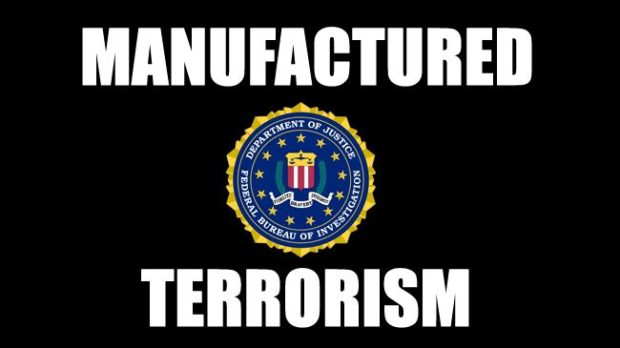
When it comes to terrorist plots committed by US government agencies, the CIA is most often the first to come to mind, especially after the botched “bay of pigs” fiasco, but the FBI has also been caught numerous times planning terrorist plots for targets to foil. In the case of nineteen-year-old, Mohamed Osman Mohamud, the FBI arrested him after he allegedly attempted to detonate a bomb at a Christmas event in Portland, Oregon. The bureau claims Mohamud had no known terrorist ties, and that he may have been radicalized through the internet, however according to an FBI affidavit, the terrorist plot was both supported and funded by the bureau after agents spent months encouraging the young man. There are numerous other cases of the FBI planning terrorist plots, manipulating participants, and even helping to carry the so called terrorist attack out. Often, if informants refuse to cooperate, the FBI has been known to simply frame them.
This concludes our countdown of the FBI’s top ten corruptions. Join us again next week for another countdown. We are Anonymous. We do not forgive. We do not forget. Expect us.
This Article (Top Ten List of FBI Corruptions) is a free and open source. You have permission to republish this article under a Creative Commons license with attribution to the author and AnonHQ.com.





